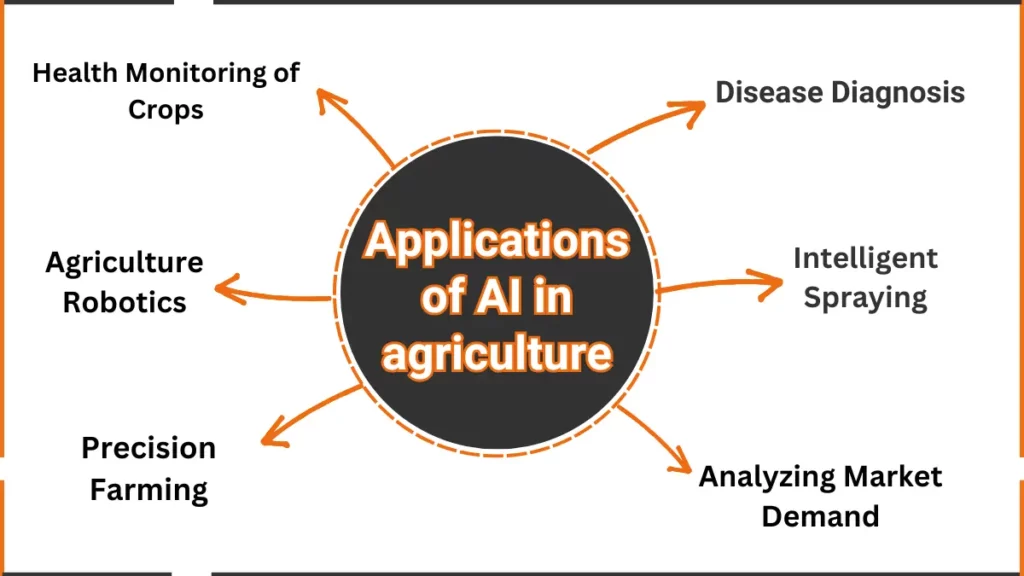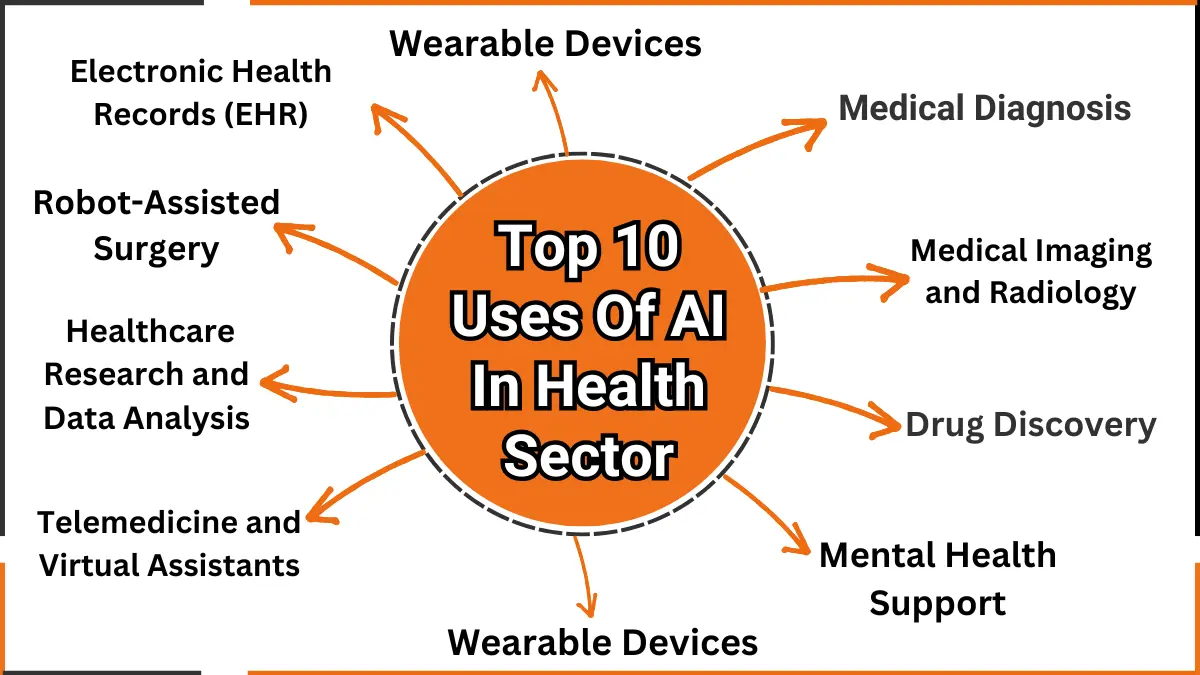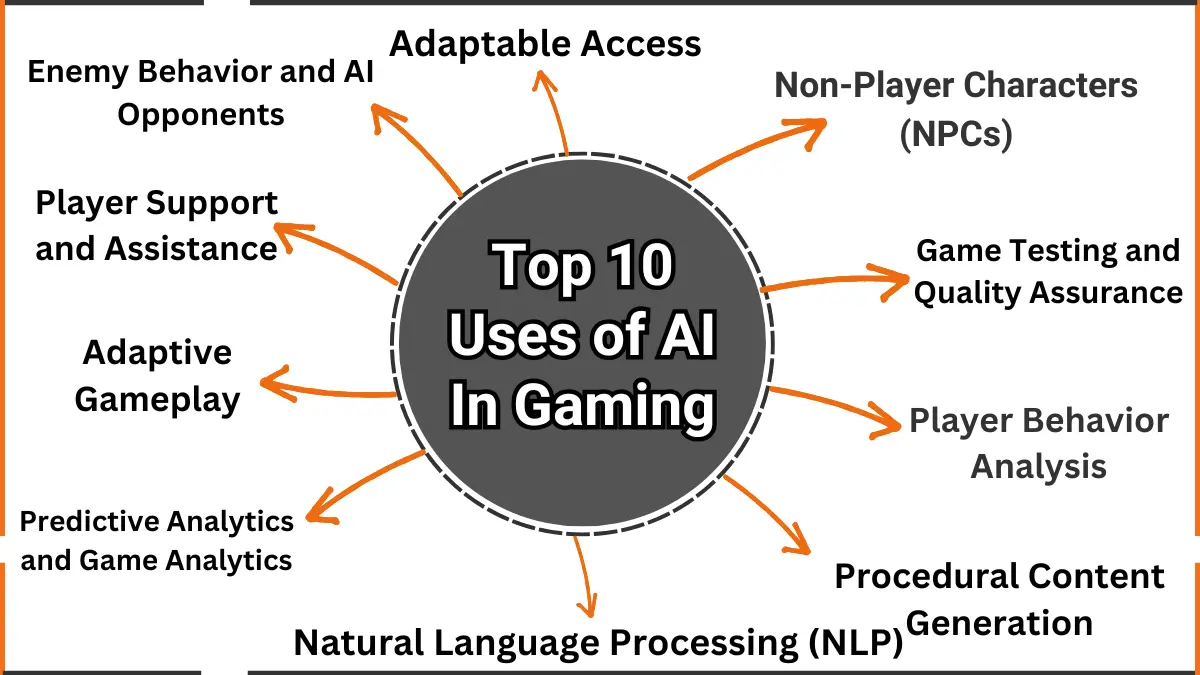Applications of AI in agriculture
Artificial Intelligence (AI) has become a game-changer in agriculture. It helps farmers to make better choices based on data and improve their farming practices.
AI helps ensure that we can produce enough food in a sustainable and efficient way. By doing so, we can meet the increasing demand for food worldwide and improve farming.
In this article, we will discuss AI’s applications in agriculture, including weather and price forecasting, crop health monitoring, agriculture robotics, intelligent spraying, disease diagnosis, precision farming, and analyzing market demand.

Uses of AI in Agriculture
Different uses of AI in agriculture are given below:
Weather & Price Forecasting
AI algorithms are incredibly helpful in predicting weather and market prices. They analyze large amounts of historical data, such as weather conditions, crop information, and market trends, to generate accurate forecasts.
Farmers can use this information to decide which crops to grow, when to plant them, and how to approach the market. This ultimately improves their profits and reduces risks caused by unpredictable weather.
Disease Diagnosis
AI has developed tools for diagnosing crop diseases, helping farmers identify and manage them. AI algorithms can accurately detect diseases and suggest suitable treatments by analyzing visual symptoms, soil conditions, and historical data.
This proactive approach enables farmers to prevent disease spread, take targeted actions, and optimize resource use, ultimately protecting crop yields.
Health Monitoring of Crops
AI has developed the technology to facilitate real-time monitoring and assessment of crop health. Sensors and imaging techniques capture data on plant growth, nutrient levels, moisture content, and pest infestations.
Machine learning algorithms analyze this data to detect irregularities and patterns, enabling farmers to identify potential issues early on. Farmers can optimize resource allocation, enhance crop productivity, and minimize losses caused by diseases or pests with timely interventions.
Agriculture Robotics
Robots with AI algorithms can automate agricultural tasks like planting, harvesting, and weeding. These robots work with great precision and efficiency. AI helps them to navigate fields, recognize crops, and make independent decisions. This reduces labour costs and boosts overall productivity in farming.
Intelligent Spraying
AI-powered spraying systems use computer vision and machine learning to find and treat specific plants or areas with pesticides or fertilizers. Farmers can reduce chemical usage, minimize environmental harm, and better use resources by targeting only the necessary areas.
This technology improves spraying efficiency, lowers costs, and protects beneficial organisms.
Precision Farming
Precision farming integrates AI, IoT (Internet of Things) sensors, and data analytics to enable precise and site-specific crop management. Through real-time monitoring of soil conditions, moisture levels, and nutrient requirements, farmers can optimize irrigation and fertilization practices.
AI algorithms analyze collected data to provide customized recommendations, improving resource efficiency, crop quality, and overall sustainability.
Analyzing Market Demand
AI technologies help farmers to analyze market demand, assisting them in making informed decisions about crop selection and production levels. AI models provide valuable insights into market dynamics by analyzing extensive market data, such as consumer preferences, pricing trends, and demand forecasts.
This allows farmers to align their production strategies with market demands, reducing waste and maximizing profitability.
FAQs
How is AI used in agriculture?
AI in agriculture involves using advanced technologies to improve crop production, monitor fields, and manage resources efficiently.
What is precision farming with AI?
AI enables precision farming by using data to target specific areas of fields for planting, watering, or fertilizing, reducing waste.
How is AI used in agriculture?
AI in agriculture involves using advanced technologies to improve crop production, monitor fields,
Can AI help in crop monitoring?
AI-powered drones and sensors monitor crops, identifying diseases, pests, and nutrient deficiencies in real time.







Leave a Reply